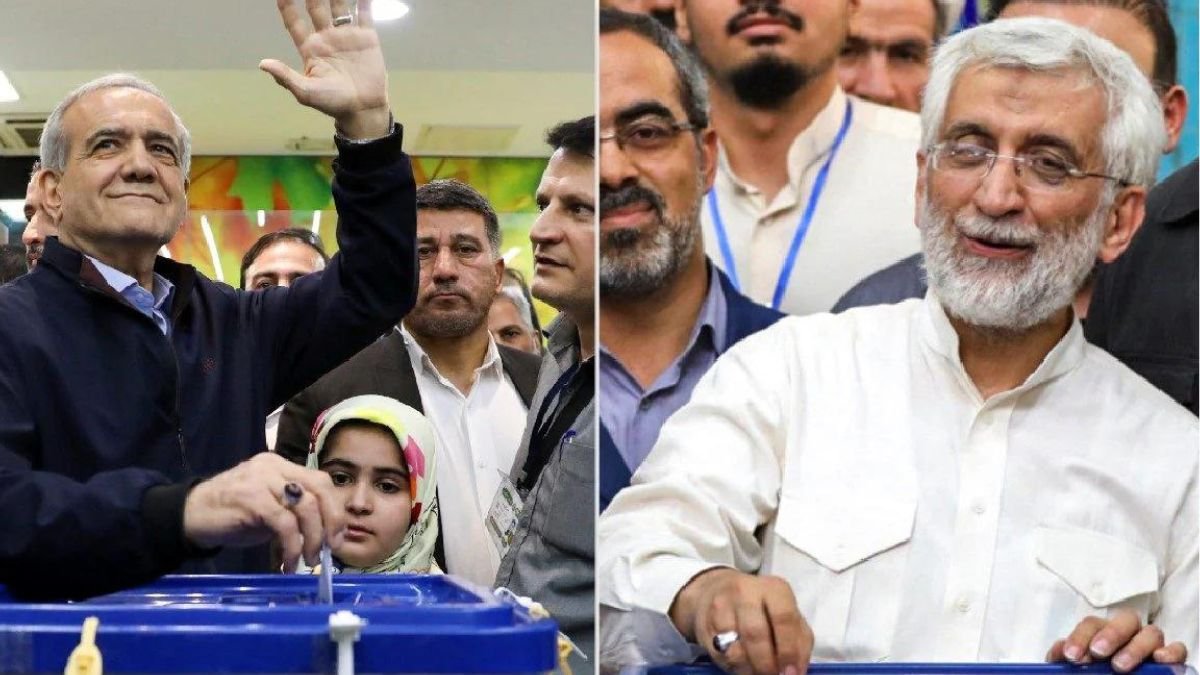Iran presidential elections: The results released on Saturday showed the lowest-ever voter turnout in the history of the Islamic Republic, resulting in Iran holding a runoff election pitting a little-known reformist against a former hard-line nuclear negotiator.
More than 60 percent of voters did not vote in the race in which reformist Masoud Pezeshkian defeated Saeed Jalili, who was running alongside two other hard-liners.
Iran presidential elections: Runoff Polls Details
Now that Jalili is running alone against the cardiac surgeon, Pezeshkian’s campaign must draw voters into a July 5 runoff they otherwise would not have participated in, as public anger mounts after years of economic hardships and of mass demonstrations in Iran under the Shiite theocracy.
“Let’s look at it as a protest in its own right: A very widespread choice to reject what’s on offer – both the candidates and the system,” said Sanam Vakil, the director of Chatham House’s Middle East and North Africa program. “That tells us a lot about public opinion and apathy, and frustration. It sort of brings it all together.”
Iran presidential elections: Election Results
Of the 24.5 million votes cast in Friday’s election, Pezeshkian garnered 10.4 million while Jalili got 9.4 million, election spokesman Mohsen Eslami said. Parliament Speaker Mohammad Bagher Qalibaf received 3.3 million votes, while Shiite cleric Mostafa Pourmohammadi got more than 206,000 votes.
ALSO READ: Iran Warns Israel Against ‘Obliterating War’ in Lebanon Amid Escalating Tensions
Under Iranian law, a winner must receive more than 50 per cent of all votes cast. Otherwise, the top two candidates will participate in a second round a week later. There has only been one presidential runoff in Iran’s history: in 2005, when hardliner Mahmoud Ahmadinejad defeated former president Akbar Hashemi Rafsanjani.
Signs of Public Disappointment
As has been the case since the 1979 Islamic Revolution, women and those demanding radical change are prohibited from running, and the elections themselves are not subject to internationally recognised controls.
There were signs of public disappointment with this election. According to the results, more than a million votes were declared invalid, which is usually a sign that people feel obliged to vote but do not want to choose any of the candidates.
According to the results, the overall turnout was 39.9 per cent. The 2021 presidential election in which Raisi was elected recorded a turnout of 48.8 per cent, while the legislative elections in March recorded a turnout of 40.6 per cent.
Calls for Boycott
Calls for a boycott have been raised, particularly by Narges Mohammadi, the imprisoned Nobel Peace Prize winner. Mir Hossein Mousavi, a leader of the 2009 Green Movement protests and still under house arrest, refused to vote with his wife, according to his daughter.
Some also criticised the fact that Pezeshkian represented just another government-backed candidate. In a documentary about the reformist candidate broadcast on state television, one woman said her generation was “moving toward the same level” of hostility toward the government as Pezeshkian’s generation during the 1979 revolution.
FOLLOW US ON X: CLICK HERE




![New Muslim Convert Brings Pig for Aidiladha – You Won’t Believe What Happened Next! [Viral Video]](https://malaysiansnews.com/wp-content/uploads/2024/06/Pig.jpg)